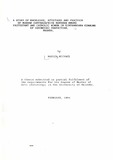| dc.description.abstract | This study is on the knowledge, attitudes and practice of modern contraceptive methods among married women of the Protestant and Catholic faiths in Kinyamakara Commune of Gikongoro Prefecture, Rwanda. The researcher set out to establish whether there were any -significant differences in• knowledge, attitudes and practice of modern contraceptives among married women of the Catholic and Protestant Christian fai ths. These two Christian fai ths were chosen firstly because they are the most dominant religions in Rwanda, accommodating the majority of the population, and secondly because they are known to have a clear stand on the use of contraceptives among their faithful and the population at large.
It was hypothesised that, due to the widespread nature of the Christian religions in Rwanda, these had some influence on the people's knowledge, attitudes and practice of modern contraceptives. The study aimed at finding out whether this influence was positive or negative, and whether it was more prevalent among the Catholic or the Protestant married women. In order to measure the levels of contraceptive knowledge, attitudes and practice in the area of study, eight hypotheses have been used: They relate to education, work status, family economic status, age, number of living children, number of additional children desired,
v
Catholic belief and Protestant belief on knowledge, attitudes and practice of modern contraceptives.
The study uses a stratified sampling method to randomly select respondents for interview, fifyteen randomly chosen respondents were selected from each of the ten secteurs of the commune. This thus gave rise to a sample size of one hundred and fifty respondents which was large enough for statistical analysis.
In presenting the data, we relied mostly on the use of simple frequency and percentage tables. A Chi-square test of significance was used to test the relationship between the independent and dependent variables. We also used the contingency coefficient to show the strength of the relationships.
The cross-tabulations revealed a negative effect of the
catholic belief on knowledge, attitudes and practice of modern contraceptive methods. On the other hand, according to what was hypothesized, protestant belief was found to be positively related to contraceptive knowledge, attitudes and practice.
A positive association was found between the wife's age
and her knowledge, attitudes and practice of modern contraceptive methods while the wife's number of living children was positively related to knowledge, attitudes and practice of modern contraceptive methods as would be expected.
As was hypothesized, an inverse relationship was found to exist between the wife's desire for additional children and her knowledge, attitudes and practice of modern contraceptives.
On the other hand, the level of knowledge of modern contraceptive methods increased as the wife's family economic status increased while favorable attitudes and practice of modern contraceptive methods decreased with the wife's family economic status.
In addition, the work status was found to be positively related to contraceptive knowledge but attitudes and practice of modern contraceptive methods decreased from unemployed wives to the employed counterparts.
As was hypothesized, education of wives was found to be positively related to modern contraceptive knowledge while the relationship between education, attitudes and practice does not support this hypothesis.
After testing the hypotheses using chi-square at 99 per cent confidence level, the conclusions were as follows:
There is no significant relationship between the catholic religious belief a wife has and her knowledge, attitudes and practice of modern contraceptive methods.
There is no significant relationship between the
protestant religious belief ~ wife has and her knowledge, attitudes and practice of modern contraceptive methods.
There is a negative relationship between the wife's desire for additional children and her knowledge, attitudes
of modern contraceptive methods.
There status, age,
children a
is no significant family economic
wife has and her
relationship between work status, number of living
knowledge, attitudes and
practice of modern contraceptive methods.
On the basis of the above findings, we recommended among other things, the liberalization of the catholic religion, the improvement of education standards and the increase of the age of marriage in order to improve on the wives attitudes I knowledge and practice of modern contraceptive methods. These recommendations would help Rwanda and particularly the area of study reduce the problem
of rapid population growth. | en |

